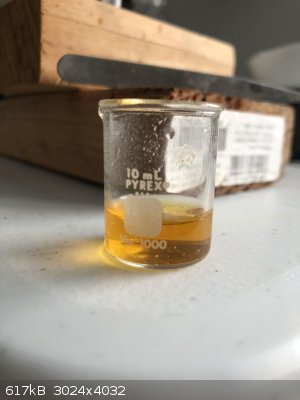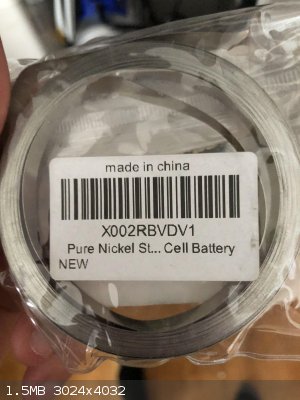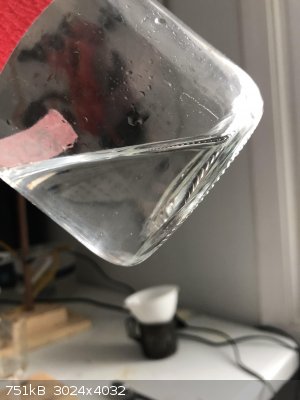Raid
Hazard to Everyone
  
Posts: 202
Registered: 14-11-2022
Location: N/A
Member Is Offline
Mood: School
|
|
Nickel Nitrate Turning Brown.
I was recently trying to make nickel nitrate for NHN synthesis but when ever i add the nickel metal to the fuming nitric acid it always goes brown and
emits lots of NO2, im guessing that its brown because of the NO2 but im wondering if im correct and how i can remove it from the nickel nitrate. I was
using a reflux setup to make this but im kinda thinking that the helped with the NO2 pollution.
Oh and just to clarify the nickel im using is 99.6% pure
If you have any ideas of how i can fix this please write below or something.
Thanks
[Edited on 14-11-2022 by PINKBOII]
[Edited on 14-11-2022 by PINKBOII]
|
|
|
Laboratory of Liptakov
International Hazard
    
Posts: 1387
Registered: 2-9-2014
Location: Technion Haifa
Member Is Online
Mood: old jew
|
|
Is your nickel really pure The nickel? Thus powder from chemical store? Or some scraps, chips, plate from coins and similary ?
Development of primarily - secondary substances CHP (2015) Lithex (2022) Brightelite (2023) Nitrocelite and KC primer (2024)
|
|
|
ManyInterests
National Hazard
   
Posts: 930
Registered: 19-5-2019
Member Is Offline
|
|
I've made nickel nitrate a few times and successfully made NHN (both dextrinated and otherwise). My suggestion is that you use azeotropic nitric acid
and not fuming.
My first time resulted in a runaway, but this was due to not keeping all the ingredients ice cold as needed. My 2nd attempt was a success, but it
could have been better due to me not understanding the melting point of nickel nitrate. Thus I will post my 3rd attempt and how I did it (if I
remember correctly).
Firstly, in your boiling flask (I used a 100ml at first, and a 250ml flask later. Though be careful to make sure the joint is well sealed as the
weight of the flask might make it drop) put 10g of nickel metal ( I got mine off amazon and it is 99.96% pure) and 15ml of 68 to 75% nitric acid (ice
cold. Cool it in your freezer for a while before adding it) and around 2.5ml or 5ml of 30% H2O2 (hydrogen peroxide). The peroxide isn't really
necessary, but it help things get going. You can adjust the ratios accordingly.
After adding the nitric acid to the nickel, it should start to react right away, so the moment you add it to your flask, you should be ready to put
your flask to the condenser joint in a second. Make sure you have cold water running in your condenser already. After the reaction cools down a little
you can add (dropwise) the peroxide to the mixture (I unsealed mine slightly before dripping it in and attaching it back real quick. It would be
easier if you have a 2-necked flask with a stopper).
After this, you must heat the boiling flask with a hot water bath at 95-100c. The whole time for the reaction is 2 to 3 hours or so. After this. just
let everything cool down and you will have a nice crop of crystals in your boiling flask.
I've never been able to get my nickel nitrate crystals out of the flask. So I just just added the boiling hot distilled water to dissolve it (it's a
judgement on how much you need, but add slowly). You will be left with some unreacted nickel metal that can be reused for more nickel nitrate later.
It should be an emerald green solution. Carcinogenic and must be handled with care, but it is a beauty to behold.
Good luck on your NHN synth!
I don't know why anyone would use coins or some other objects that almost always have other things in them. Nickel metal can be bought on amazon,
ebay, and aliexpress and isn't hard to find. The nickel metal strips I got from amazon are basically a lifetime supply and I am nowhere near finished
since it takes a lot of nitric acid to really use up all the metal.
[Edited on 14-11-2022 by ManyInterests]
|
|
|
Raid
Hazard to Everyone
  
Posts: 202
Registered: 14-11-2022
Location: N/A
Member Is Offline
Mood: School
|
|
Thanks, ill try that.
|
|
|
Texium
|
Thread Moved
14-11-2022 at 09:43 |
B(a)P
International Hazard
    
Posts: 1139
Registered: 29-9-2019
Member Is Offline
Mood: Festive
|
|
The suggestion made by ManyInterests to use azeotropic nitric acid is a good one. The peroxide, if you have it, is also a good idea to help the
reaction along and minimise NO2. Also note the low boiling point of nickel nitrate, take care to do this in a well ventilated space.
|
|
|
Raid
Hazard to Everyone
  
Posts: 202
Registered: 14-11-2022
Location: N/A
Member Is Offline
Mood: School
|
|
i just tried to do this again and it still turns brown, I did everything the manyinterests said and I still did not work 
|
|
|
B(a)P
International Hazard
    
Posts: 1139
Registered: 29-9-2019
Member Is Offline
Mood: Festive
|
|
To help, we are going to need some more details.
How much nickel did you use, what type and where did you source it?
How much nitric acid did you use, what concentration, where did you source it and how did you do the addition?
How much peroxide did you use, what concentration, where did you source it and how did you do the addition?
What temperature control did you use?
What observations did you make along the way?
Did you add anything else?
|
|
|
woelen
Super Administrator
        
Posts: 8012
Registered: 20-8-2005
Location: Netherlands
Member Is Offline
Mood: interested
|
|
I only have one explanation for this. One of your reagents is impure. If you use ordinary nitric acid (not the fuming acid or acid, containing a lot
of dissolved NO2), then it should be colorless. If you use 99.6% pure nickel, then your solution really should be green. The gas mix above the liquid
will become brown/red.
If you use acid of very high concentration, then your liquid indeed may get a brown hue, but on dilution with a little water (e.g. 2 parts of solution
to 1 part of water), this brown hue should disappear. On heating, the brown hue also should disappear (you then drive off NO/NO2).
A common impurity in nickel is iron, this could lead to a yellow/brown color.
I once did the reactiopn, without added peroxide, and I got a nice green solution of Ni(NO3)2 with excess HNO3 mixed with it.
|
|
|
SuperOxide
Hazard to Others
  
Posts: 486
Registered: 24-7-2019
Location: Devils Anus
Member Is Offline
|
|
PINKBOII, any update on this? I planned on making nickel nitrate using some azeotropic HNO3 and some 99.6% pure Ni strips I purchased off of Amazon as well.
Is your nitric acid DIY? Maybe it's not as pure as you think?
|
|
|
SuperOxide
Hazard to Others
  
Posts: 486
Registered: 24-7-2019
Location: Devils Anus
Member Is Offline
|
|
PINKBOII, I finally got around to get the nickel nitrate made. Im pretty sure were using the same source for the nickel (from Amazon). The nitric acid
is DIY RFNA, with water added intermittently to help deal with the passivation.

  
Can you share pics of your "brown" nickel nitrate?
|
|
|
Raid
Hazard to Everyone
  
Posts: 202
Registered: 14-11-2022
Location: N/A
Member Is Offline
Mood: School
|
|
yeah here is a picture of what im using, the nickel is said to be 99.6 present pure. basically what's happening is when i add the nitric acid to the
nickel it starts off slow and gets green then it very rapidly gets hot and starts to boil/bubble and the solution gets brown, the pic is from after i
tried to scrub no2 with 30% peroxide. im not sure if the nickel is getting to hot and decomposing of whats happening, its seem quite easy for all of
you to do it.
also im using around 70% nitric acid. and i guess the solution looks more golden then brown, but it was browner when un-diluted.
  
|
|
|
Deathunter88
National Hazard
   
Posts: 519
Registered: 20-2-2015
Location: Beijing, China
Member Is Offline
Mood: No Mood
|
|
Quote: Originally posted by PINKBOII  |
yeah here is a picture of what im using, the nickel is said to be 99.6 present pure. basically what's happening is when i add the nitric acid to the
nickel it starts off slow and gets green then it very rapidly gets hot and starts to boil/bubble and the solution gets brown, the pic is from after i
tried to scrub no2 with 30% peroxide. im not sure if the nickel is getting to hot and decomposing of whats happening, its seem quite easy for all of
you to do it.
also im using around 70% nitric acid. and i guess the solution looks more golden then brown, but it was browner when un-diluted.
|
Those nickel strips for making battery contacts are usually nickel plated steel, so what you are doing is forming a small amount of nickel nitrate
(the inital green) then it is turning brown because you are forming mostly iron nitrate after the plating is stripped off.
|
|
|
Raid
Hazard to Everyone
  
Posts: 202
Registered: 14-11-2022
Location: N/A
Member Is Offline
Mood: School
|
|
oh wow thanks that makes more sense now. 
|
|
|
SuperOxide
Hazard to Others
  
Posts: 486
Registered: 24-7-2019
Location: Devils Anus
Member Is Offline
|
|
Quote: Originally posted by Deathunter88  | | Those nickel strips for making battery contacts are usually nickel plated steel, so what you are doing is forming a small amount of nickel nitrate
(the inital green) then it is turning brown because you are forming mostly iron nitrate after the plating is stripped off. |
In the picture it says "Pure Nickel St..." You think its maybe Pure Nickel Steel plating or something like that?
Can you go back through your Amazon orders and share the product link? (I tried looking for X002RBVDV1, no luck)
[Edited on 2-1-2023 by SuperOxide]
|
|
|
Raid
Hazard to Everyone
  
Posts: 202
Registered: 14-11-2022
Location: N/A
Member Is Offline
Mood: School
|
|
yeah ill go get the product, im currently trying to return it.
i think this is the one I bought https://www.amazon.com/outstanding-9-8feet-Battery-Welding-A...
do you guys think I should buy another nickel strip on amazon or go on ebay and buy some nickel pellets, the pellets seem purer but its double the
price, it's 21$ for a half a pound do you think its worth or not.
|
|
|
Raid
Hazard to Everyone
  
Posts: 202
Registered: 14-11-2022
Location: N/A
Member Is Offline
Mood: School
|
|
also, i tested it for pure nickel like it said it was and it was just a plate, wich was really disappointing. i wastes so much time and nitric acid on
this seeing if it work work. I'm not sure why I did not test it sooner.
|
|
|
woelen
Super Administrator
        
Posts: 8012
Registered: 20-8-2005
Location: Netherlands
Member Is Offline
Mood: interested
|
|
Do not buy from cheap chinese sellers on eBay or Amazon. This kind of products nearly always has some issue. In this case, it is just plated iron,
while the description suggests it is pure nickel. The last few years, buying from cheap chinese sellers has become much more risky than e.g. 10 years
ago. So many sellers, who sell crap. Most people who buy from these sellers do not even notice, at least not immediately. In this case, people use it
for making conducting connections, by welding things on the strip. The plated strip does the job also, at least for some time, and when things fail,
the seller already is gone, or your period for reclaiming money, changing your rating, etc. is over. You dissolved the strips, that's how you quickly
discovered something is wrong.
[Edited on 3-1-23 by woelen]
|
|
|
SuperOxide
Hazard to Others
  
Posts: 486
Registered: 24-7-2019
Location: Devils Anus
Member Is Offline
|
|
Btw, after making the nickel nitrate, I figured I would just distill off any excess acid/water, and I would go til dryness. Well, little did I know
that nickel nitrate boils at 136.7°C.
I ended up distilling over some nickel nitrate... Never would have expected that, lol.
Pics: https://imgur.com/a/8KtfKpg (Slightly out of order, sorry)
Crystals: https://imgur.com/a/dcwux2K
|
|
|
woelen
Super Administrator
        
Posts: 8012
Registered: 20-8-2005
Location: Netherlands
Member Is Offline
Mood: interested
|
|
Nickel nitrate does not really boil at 136.7 C. What really happens (and which is a common effect with many hydrated salts), is that on heating an
hydrated salt part (or all) of its water of crystallization is split off and becomes available as free water. This free water usually becomes
available as liquid. The remaining salt partially dissolves in the water. Some salts can completely dissolve in their own freed water of
crystallization. If heating continues, then the water boils off and a solid remains with less water in it. Many salts decompose further at that point,
e.g. nickel nitrate will partly hydrolyse and on stronger heating there will be loss of HNO3 and basic nickel nitrate remains behind (which is a
non-stoichiometric solid, containing nickel-ions, nitrate ions and hydroxide ions). This stuff is insoluble in water. Even stronger heating may lead
to complete destruction of the nitrate and then you see formation of NO2 and O2 as well.
A very nice example of similar behavior can be observed with swimming pool NaHSO4.H2O, the well-known pH-minus you can buy in hardware stores. If you
heat that, then you see the solid "melting" at just 60 C or so. On continued not too strong heating you can boil off the water and you get anhydrous
NaHSO4.
Other salts which very nicely dissolve in their own water of crystallization on heating are CH3COONa.3H2O and Na2S2O3.5H2O. On cooling down, you can
also form the hydrated salt again and you can see the liquid matter solidify in seconds, with production of easy to observe heat in the process. These
are funny experiments in their own.
[Edited on 4-1-23 by woelen]
|
|
|